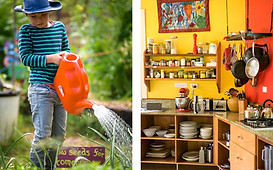

Our Mission Statement:
Tuntable Falls Community School believes in an educational approach that provides children with experiences to grow into their unique selves in an inter-dependant web of community.
Community is at the centre of our philosophy. We nurture dynamic and interwoven relationships between children, staff, families, and the broader community to foster a deep sense of belonging.
We hold space for children’s self-expression, discovery, and personal growth by cultivating mutual respect and modelling empathy within a diverse community.
Children learn through unique experiences that the environment and community are inseparable from themselves. By supporting children’s individual learning styles, they are equipped with the passion, knowledge, and tools to build their own future.
At Tuntable Falls Community School we equip our students with the knowledge and skills to be curious learners and embrace a wide realm of future educational and life choices. Our strong numeracy and literacy focus is delivered through progressive, experiential programs that value children’s individual learning styles.
Sustainable and Environmental Education (SEE) is the core pillar of our curriculum, and the guiding principle of our management and resource decision making.

Up We Grow
Over the last forty years the Tuntable Falls Community School has steadily grown from a small one classroom school to acquire several additional buildings and invaluable resources.
With a flourishing vegetable garden, large child friendly kitchen, well-stocked cosy library, music and dance facilities, maker-space, thriving beehives and a new nature playscape, our children can immerse themselves in learning through play while teachers creatively facilitate opportunities to inspire their curiosity.

Stephanie Alexander
Kitchen Garden
We completed our Stephanie Alexander Kitchen Garden in 2013. This beautiful garden and kitchen are fully integrated into our learning programme as well as our daily school routines.
The children all contribute to what is grown, and they take great pride in gathering and helping to prepare the produce for the scrumptious vegetarian school lunches.

Nature Playscape
Through a 2019 NSW Government’s My Community Project grant we have been privileged to imagine and construct a new nature playscape with a wide and wonderful range of equipment and spaces for sensory exploration and physical discovery.
The children’s rainforest playground is beautifully complimented by a giant pendulum rope swing, timber tepees, obstacle logs, flying fox, tunnel slide, rope climbing ramp and the newly refurbished cubby castle and water-play sandpit.

Our School Year:
Our school has made the conscious decision to have fewer school days in the academic year, and this choice is rooted in several key principles that prioritise the overall development and well-being of our students.
Here are the primary reasons behind this approach:
1. Emphasis on Educational Quality
We believe that the quality of education is far more important than the quantity of instructional time. By reducing the number of school days, we can concentrate on creating a highly effective and engaging learning environment. Our focus is on delivering a curriculum that fosters critical thinking, creativity, and deep understanding, rather than merely extending the time spent in classrooms. This approach ensures that each school day is impactful and meaningful for our students.
2. Promoting Student Well-Being
Student well-being is at the forefront of our educational philosophy. Extended breaks and fewer school days help to alleviate stress and prevent burnout among students. This balance allows them to enjoy a healthier lifestyle, with more opportunities for rest, relaxation, and personal growth. Time away from school enables students to recharge, resulting in improved mental health and a more positive attitude towards learning.
3. Encouraging Extracurricular Activities and Family Time
By having a shorter school year, we provide students with more time to engage in extracurricular activities, pursue hobbies, and spend quality time with their families. These experiences are crucial for developing well-rounded individuals. Activities outside of school help students build essential life skills, such as teamwork, leadership, and time management. Additionally, family time strengthens relationships and provides a supportive home environment, which is vital for student success.
4. Economic Priorities
Operating a school involves significant expenses, including utilities, staffing, and maintenance. By reducing the number of school days, we can better manage these costs. The savings are reinvested into enhancing our educational resources, such as improving facilities, maintaining small student/staff ratios, and providing ongoing professional development for our teachers. This efficient use of resources ultimately benefits our students by supporting a high-quality learning environment.
5. Flexibility and Innovation in Learning
Fewer school days allow us to implement more flexible and innovative educational practices. For instance, we can incorporate blended learning models that combine the various learning areas into integrated units. This flexibility accommodates diverse learning styles and needs, ensuring that each student can progress at their own pace. Such an approach prepares students for the future, where adaptability is increasingly important.
6. Evidence of Academic Success
Research has shown that more school days do not necessarily lead to better academic performance. Our experience aligns with this finding, as our students consistently achieve high academic standards. By focusing on effective teaching methods and student engagement, we can maintain strong academic outcomes without extending the school year. This evidence reinforces our commitment to a balanced and holistic approach to education.
Conclusion
Our decision to have fewer school days is guided by a commitment to providing the best possible education for our students. By prioritising educational quality, student well-being, and economic priorities, we create a supportive and enriching environment that prepares students for success in school and beyond. This approach reflects our belief that a balanced and thoughtful education system is essential for nurturing capable, happy, and well-rounded individuals.


